Happy People Read and Drink Coffee.
by Agnes Martin-Lugand
[Book]
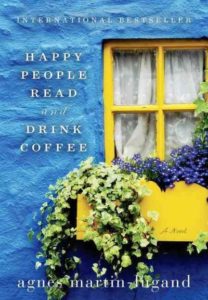
view/request
It’s been a year since Diane’s husband and small daughter died tragically, and she hasn’t left her Paris apartment. Her friend Felix has been running their bookstore cafe, Happy People Read and Drink Coffee, into the ground. Her parents and in-laws think she simply needs to move on. That doesn’t seem possible, but one day she decides to move to Ireland, choosing the spot by placing her finger on a map. There, the volatile weather, the tiny village, and a hostile neighbor all contribute to her cigarette and wine-fueled return to life. She makes bad decisions, makes better decisions, and navigates her revised existence mostly on her own. Translated from the French by Sandra Smith, movie rights have already been sold and a sequel is imminent. For readers of women’s journeys and tales of hope, this slim volume engages the thoughts and feelings without whitewashing grief.
Reviewed by Alene
Tagged: Fiction, Grief, Inspiration, Ireland, Women
Spinning Silver
by Naomi Novik
[Book]
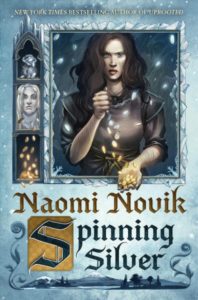
view/request
Spinning Silver is a fairy-tale inspired fantasy set in Lithvas, a fictional country with with elements of Lithuanian, Polish, and Russian history and culture. The kingdom is ruled by a tsar. The economy is largely agrarian with barley and wool playing an important role. Winters are harsh. With its combination of Eastern European culture, fairy-tale like magic, and modern sensibilities, Spinning Silver has much in common with Naomi Novik’s Uprooted, and folks who enjoyed Uprooted will enjoy Spinning Silver as well. That said, Spinning Silver is the darker and more complicated story, and much of that complexity and darkness comes from a simple fact: Miryem, the central character in the novel, and her family are Jews.
Though much of Spinning Silver is fantasy, the antisemitism that shapes the outlook of so many of its characters is not. Novik said in an interview with Paste magazine that “Spinning Silver is about my father’s family, and they were Lithuanian Jews who had to escape persecution”. Distrust is high and misunderstandings are common (Wanda, a farm girl, mistakes the family’s sabbath prayer for a magical spell), and Miryem and her family are always aware that their lives could be disrupted by anti-Jewish violence. And as moneylenders their role in the local economy is both welcome and despised.
Spinning Silver is about value and assessment, debts and promises, trades and bargains. Miryem’s strength comes ultimately from her recognition of her own worth and her insistence on not being undervalued. And Miryem, Wanda, and Irina, the three main women in the story, are all remarkable for their cool level-headedness and practical outlook. Whether trading in the market, bargaining with an otherworldly ice king, exorcising a demon, or deciding whether or not to accept the hand of suitor, these women stand up for themselves and make careful, calculated decisions. In Spinning Silver these well reasoned decisions and difficult compromises are celebrated and, at least in Miryem’s case, elevated to the point of high magic.
Spinning Silver is one of the most enjoyable books I have read this summer. If you enjoy a good fairy tale I highly recommend you give it a try.
Reviewed by Ben
Tagged: Fairy tales, Fantasy, Fiction, Women
Hunger: A Memoir of (My) Body
by Roxane Gay
[Book]
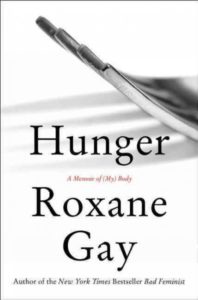
view/request
Roxane Gay’s memoir Hunger: A Memoir of (My) Body is startling. It is moving and important. It is hard to read and hard to put down.
In this memoir of her body Gay puts into words so much that would generally be left unsaid. Gay’s writing is clear and concise. It does not shy from the contradictions in life. It is both restrained and emotional. It is devastating. Gay tells us about her life. She was raped at the age of twelve. She is fat. She is scared. She is complex, intelligent, insightful, compassionate, and a brilliant writer. She lives a privileged life and recognizes her privilege. She is the subjected to great prejudice and discrimination. In Hunger she shares truths that must be incredibly difficult to share and she does so very well.
Gay’s book tells us much about her life, but it also tells us much about our culture, our country, our attitudes. We are not kind to fat bodies. We are not kind to women’s bodies. We are not kind to black bodies. We are not kind to ourselves. You probably already know this, but Gay’s book will still open your eyes. Her perspective is probably not one you have heard before.
On the back of the dust jacket Ann Patchett tells us why this book is important and I cannot improve on what she says. She writes:
“It turns out that when a wrenching past is confronted with wisdom and bravery, the outcome can be compassion and enlightenment—both for the reader who has lived through this kind of unimaginable pain and for the reader who knows nothing of it. Roxane Gay shows us how to be decent to ourselves and decent to one another. Hunger is an amazing achievement in more ways than I can count.”
Reviewed by Ben
Tagged: Memoir, Non-fiction, Trauma, Women
Girl Meets Boy: The Myth of Iphis
[Book]
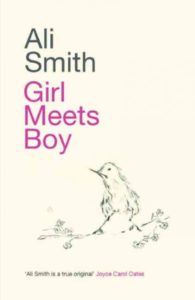
view/request
In Ovid’s Metamorphosis, tucked away between stories about just how cruel gods & monsters & men can be, is a happy myth about a girl falling in love with another girl. In Girl Meets Boy, Ali Smith takes this myth of Iphis and Ianthe into the twenty-first century, and the result is a story that celebrates transformation, love, and civil disobedience.
In Inverness, dreamy twenty-something Anthea quits her corporate job, to the chagrin of her serious-minded older sister, Imogen, and promptly falls in love with a graffiti artist. Anthea and her modern-day Iphis joyfully thwart conventions of sex and gender in this decidedly queer retelling. Told from the perspectives of Anthea and Imogen, Girl Meets Boy is written in Smith’s signature (& humorous!) steam-of-conscious style. Her love of wordplay and ear for conversations make it perfect to be read aloud.
Reviewed by Sarah
Tagged: Fiction, Literary fiction, Mythology, Women
Down the Nile: alone in a fisherman’s skiff
by Rosemary Mahoney
[Book]
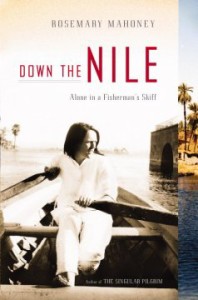
view/request
I liked this independent, determined woman. In the late 1990s, Mahoney, an American writer and experienced recreational rower, got the idea of rowing herself down the Nile. This is not allowed and virtually never done — tourists always travel on cruise boats or feluccas (small sailboats piloted by their owners). When she set out to buy a small rowboat in Egypt, she was met with disbelief. Women, even western women, did not travel alone. To a fisherman, rowing was work, so why would she want to do it herself? Felucca captains and boat owners assumed a woman couldn’t know how to row. Eventually she succeeds in her adventure, and it’s both more and less than expected but always fascinating.
Mahoney is empathetic and eloquent. She engages in conversations with Egyptian men and women she meets, learning a great deal about cultural differences, rampant poverty, and the restricted status of women. She quotes extensively from 19th-century European travelers, notably Florence Nightingale and Gustave Flaubert, and gives a selective history of tourism in the region (including colonialism and theft of artifacts) which puts the present-day in context. So much has changed and so much is the same. In particular, her descriptions of the river and its natural environment — the wildlife, vegetation, water and sky — are poetic and timeless.
Reviewed by Faith
Tagged: Egypt, Non-fiction, Rowing, Travel, Women
Where’d You Go, Bernadette?
by Maria Semple
[Book]
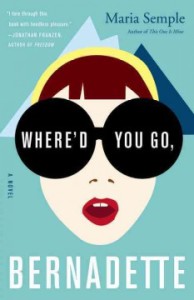
view/request
A couple of creative, perceptive and witty misfits star in this novel. Mother, wife and lapsed architect Bernadette lives in Seattle with her high-tech superstar husband and too-smart-for-social-success teenage daughter. They live in a beyond weird old house and can’t cope with their perfectly privileged and PC neighbors or private school. The format is as original as the characters: the story unfolds through letters, emails, diary entries and school documents. Maria Semple wrote for TV’s Arrested Development, so you’d expect the dialogue and plot twists to be hilarious, and they are; there are scenes that would be fabulous onscreen. There’s also sincerity and real character development in these quickly-turning pages.
Reviewed by Faith
Tagged: Fiction, Girls, Humor, Women
Birth House
by Ami McKay
[Book]
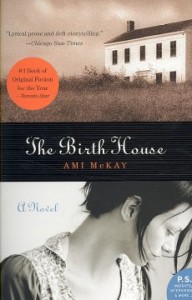
view/request
This book made me think about the births of my children as well as family tales I’ve heard from my mother and grandmother about their very different birth experiences. The clash between midwifery and “modern” medical care is at the center of this engaging story. The author does a great job of weaving in historical events and of setting the story during the nineteen-teens in a remote Nova Scotia village.
Reviewed by Lisa
Tagged: Fiction, Historical fiction, Women
Sempre Susan: A Memoir of Susan Sontag
by Sigrid Nunez
[Book]
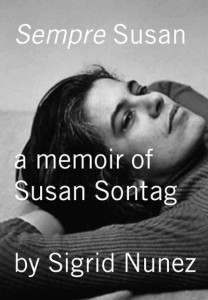
view/request
This very short memoir of the association between Ingrid Nunez and Susan Sontag recounts their friendship/mentorship during the time that Sontag was writing “On Photography” and New York literary life in the 1970’s. Nunez was hired by Sontag to help sort out her correspondence. She then became involved with Sontag’s son, David Rieff, and for a period of time the three of them lived in the same apartment. There are many glimpses into Sontag’s writing life and habits which I found very interesting. Susan Sontag is often portrayed as a very difficult person and Nunez does show some instances of how that was true but she also rounds out the portrait with other details that showed Sontag as a complicated person with many aspects including vulnerability, conflicted and humorous and loving.
Reviewed by Susana
Tagged: Biography, Manhattan, Non-fiction, Women
A Book of Secrets
by Michael Holroyd
[Book]
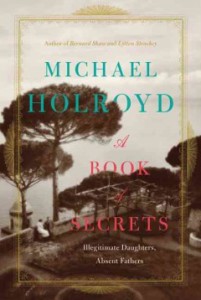
view/request
A fascinating combined biography of a place, the Villa Cimbrone on a hill above the Italian village of Ravello, and the people connected to it throughout different time periods. The work of biographer Michael Holyrod reads like a detective story and features such characters as Alice Keppel, the mistress of both the second Lord Grimthorpe and the Prince of Wales; to Eve Fairfax, a muse of Auguste Rodin; to the novelist Violet Trefusis, the lover of Vita Sackville-West and daughter of Alice Keppel. Having read extensively about some of these people already because of my interest in Virginia Woolf and the Bloomsbury Group, this book was a wonderful way to fill in some of the missing gaps and to add to my interest of this subject.
Reviewed by Susana
Tagged: Biography, England, France, Italy, Women
The Weird Sisters
by Eleanor Brown
[Book]
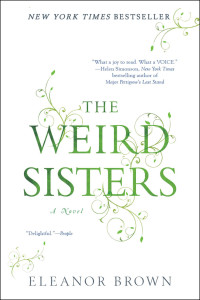
view/request
The first odd thing I noticed about this novel is that it’s told in the first person plural. It’s a clever and engaging device for sisters talking about themselves and each other, and kept me attentive to whose point of view I was reading as it shifted from the inside of a character’s head to one, two or three characters collectively observing another. The voice is opinionated, familiar, loyal, funny, and often jealous or spiteful as siblings are about each other. Not much happens (three adult sisters move home as their mother struggles with cancer; they find themselves to be more than they thought) but plot doesn’t much matter as the book is about personalities, family relationships, and how we evolve through involvement with others. A rich vein of Shakespeare runs through Weird Sisters in the naming of characters, the professor father’s constant quoting, and the cast of literary archetypes that inhabit these contemporary, believable women.
Reviewed by Faith
Tagged: Fiction, Women










